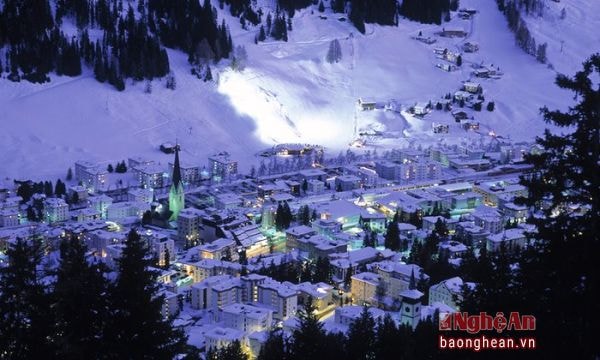World Economic Forum and the issues raised
(Baonghean) - Donald Trump's victory and the UK's exit from the European Union and many other issues will be the main topics during the annual meeting of the world's top leaders, intellectuals and businessmen at the Davos ski resort, Switzerland from January 17 to 20.
The World Economic Forum (WEF) is a Swiss-based non-profit organization that aims to improve the state of the world, with the participation of businessmen, politicians, researchers, as well as various leaders to shape international, regional as well as related economic sectors. The Forum holds its annual meeting in Davos (Switzerland) with the participation of more than 2,000 leaders from many fields around the world.
This year’s WEF will see 3,000 guests gather to discuss the state of the world. As usual, the forum will be a venue for high-profile speeches, with experts from all fields attending amid tight security.
 |
| The Davos ski resort is ready to welcome politicians, economists and businessmen to attend the World Economic Forum. Photo: Theguardian |
Trump and the rise of populism
The official theme of this year's forum, “empathetic and responsible leadership,” is perhaps timely, with Mr. Trump on his way to assuming the highest power in the United States.
In fact, Trump is an antithesis to the Davos platform, which promotes multilateralism in tackling difficult issues rather than isolation and protectionism. Trump will not be in Davos, but one of his top advisers, Anthony Scaramucci, will outline the new administration’s priorities.
Reforming capitalism
Eight years after the financial crisis, Davos finds that a stronger economy is not enough to fix the world's problems. According to the WEF's global risks report, the rise of populism, where there is a conflict between ordinary people and "elites", will mean that market capitalism must be reformed.
The forum will also discuss whether it is time to provide citizens with a basic income to support them in the face of technological advances. “Technology and machine development can reduce the number of jobs, negatively affecting a wide range of society, not just the poor,” said Ugo Gentilini, an economist at the World Bank.
Therefore, providing people with a basic income could be an option for this technological age.
China participates in the forum for the first time
For the first time at the Davos forum, a Chinese leader will speak on the importance of globalization. Xi Jinping is also the first Chinese leader to attend the forum with a large delegation of 80 business leaders, economists, researchers and journalists.
Trump's rise to power could create a power vacuum globally, which China hopes to fill. Xi is expected to address the problems countries face if they fall into protectionism and isolationism.
 |
| Poverty in China and India is getting worse. Migrants bathe in a public water tank in New Delhi. Photo: theguardian |
With Trump's announcement of withdrawing from the Trans-Pacific Partnership (TPP), Xi may push for a Beijing-led trade deal.
However, he will face pressure from European leaders who are unhappy about Chinese companies dumping exports such as steel on their markets.
Climate change
Environmental and climate issues have become more important than ever this year as the Trump administration looks set to roll back US commitments to tackling global warming.
In fact, a group of scientists warned that world temperatures were alarmingly high this past Christmas, with some parts of the Arctic experiencing temperatures as much as 200C higher than usual. According to a conference survey, environmental issues dominated global risk concerns after nuclear threats.
Automation
The Fourth Industrial Revolution is once again a concern at Davos, with the problems created by technologies such as smart robots and driverless cars. The forum will consider whether innovations will destroy millions of jobs, undermine social cohesion or fuel populism.
In addition, the use of artificial intelligence and the Internet is posing cybersecurity threats to businesses. This is also an area where regulations are still weak, and the question is: is the world ready to give decision-making power to machines?
Brexit
A year ago, it was hard to find anyone at the World Economic Forum who was thinking about Britain leaving the European Union. Brexit was a blow to the principles of the forum and they seemed to have no real understanding of what was going on in the world.
Phan Vu
| RELATED NEWS |
|---|

